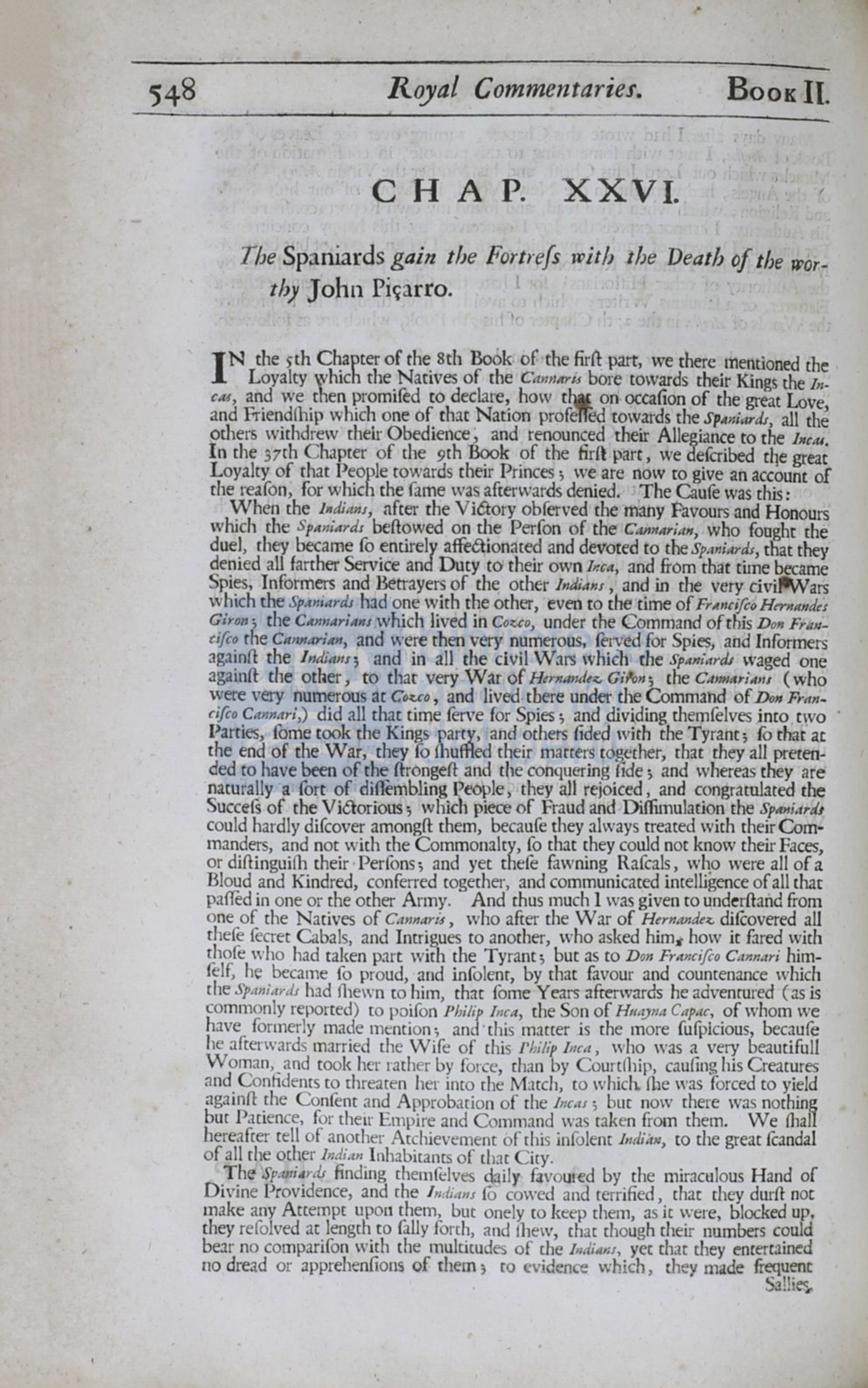

/
Royal
Commentaries.
BooK
II.
··CH AP.
XXVI.
I
The
Spaniards
gain the Fortrefs with the Death
of the wor–
thy
John
Pi~arro.
I
N the
5th
Chapter
of the
8th
Book of the
full:
part, we there
mentioned
the
Loyalty
~hich
the Natives of the
Cannn-,-is
bore towards
their
Kings the
In-
cM,
and we then promifed
co
declare, how
t
on
occafion
of the great
Love
and Friendiliip which one
of
that Nation profe
ed towards
the
Sp1tniardt,
all
th~
others withdrew thelr Obedience, and renounced their Allegiance to the
I11ca1.
In
the .;7th Chapter of the
9th B?Ok
?f the
fir!t
part,
we defcribed tqe
great
Loyalty of that People to"' ards their
Prmces ;
we are now to give an account of
the reafon) for which the fame was afterwards denied. The Caufe was this:
When the
JndiP.n1,
after the Vi&ory obferved the
many
Favours and Honours
which the
SpaniardJ
befiowed on the Perfon of the
Cannarian,
who fought the
duel, they became
fo
entirely affectionated and devoted to the
Spaniards,
tnat
they
denied all farther Service and
Duty
to their own
l1tca,
and from that time became
pies, Informers and Betrayers of the other
Indian1,
and
in
the very civ·
ars
' hich the
Spaniards
had one with the other, even to
the
time of
FrAncifco Hernandes
Giron;
the
Cannarian1
which lived in
Couo,
under the Command ofthis
Don
Fnm–
cifco
rhe
Can11aria11,
and "'ere then very numerous,
feryed
for Spies, and Informers
againfr the
lndian1;
and
in
all the civil
Wars
which the
Spam·ard.1
waged
one
againll the other, to that very War of
Hernande~
Gi
on;
the
Cannari11ns
(who
were
very
numerous at
Couo,
and
lived
there under the Command of
Dem Fr-an–
cifco Cannari,)
did all that time ferve for Spies; and divlding themfelves into
two
Parries, fame c90k the Kings
par~,
and others fided wirh the Tyrant;
fo
that
at
the end of the War, they fo !huftted their marrers togerher,
rbat
they all preten–
ded to have been of the firongeft and the conquering Tide; and whereas they are
naturally a fort of diffembling People) they all rejoiced , and congratulated the
Succe?fs of the Victorious ; which piece of Fraud and Diffunulation the
SpaniardJ
could hardly difcover arnongfr them, becaufe they always treated with their Com–
manders, and not with the Commonalty,
fo
that they could not know their
Faces,
or dHl:inguifh their Perfons; and yet thefe fawning Rafcals,
w~o
were all of a
Bloud and Kindred, conferred together, and communicated intelligence ofall that
paffed in one or the other Army. And thus much 1 was given co
~nderfiand
from
one of the Natives of
Cannaru,
who after the War of
Hernande~
difcovered all
thefe fecret Cabals, and Intrigues to another, who asked him.t how it fared with
thofe who had taken part with the Tyrant; but as to
Don
Francifco
Cannari
him–
felf, he became fo proud, and infolenr, by that favour and countenance which
the
Spaniards
had fhewn
to
him, that fame
Years
afterwards he adventured (as
is
commonly reported) to poifon
Philip Inca,
the Son of
H11ayna
Capac,
of whom
we
have formerly made mention; and ·this matter is the more fufplcious, becaufe
he afterwards married the Wife of chis
I'hilip
Inca,
who
\\o
as a very beautifull
Woman, and took her rather by force, than
by
Courtfhip, cauftng his Creatures
and
onfidems
to
threaten her into the Match, to which
{be
was forced to yield
againft the
onfent and Approbation of the
Incas;
but now there was nothing
but Patience, for
their
mpire and Command \ as taken from them. We
!hall
hereafter tell
f
another Atchievement of this infolent
Indian,
to
the great fcandal
of all the other
Indian
Inhabitants of that
ity.
The
SpaniArds
finding themfelves
daily
favoured
by
the miraet1lous Hand of
Divine Providence, and the
Indians
fo
cowed and terrified, that they durfi not
make any Attempt upon them, but onely to ke p them, as
it
were, blocked up,
they
refolved at length to fally forth, and fhew, that though their numbers could
bear no comparifon with the multimdes of the
Jndi11m,
yet
that they entertained
no dread or apprehenfions of them; ro ev·dence which,
they
made frequent
..,a.·~
'.














